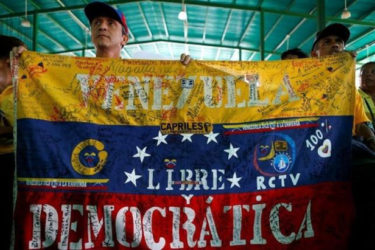SANTO DOMINGO, (Reuters) – U.S. Secretary of State John Kerry announced high-level talks to ease tensions with Venezuela’s socialist government yesterday, just hours after he backed calls for a referendum that could force President Nicolas Maduro from office.

Kerry said the talks would start immediately in Caracas and be led by Thomas Shannon, a veteran of U.S. diplomacy in the region. Attempts last year at dialogue between the ideological foes were stalled by Venezuela’s deepening crisis.
The two countries have been embroiled in diplomatic hostilities since the administrations of Venezuelan President Hugo Chavez and U.S. President George W. Bush. Kerry said the goal was to go beyond “the old rhetoric.”
“I’ve committed to see if this can work so let’s see if we can improve the relationship,” he told reporters, after huddling with his Venezuelan counterpart on the sidelines of an Organization of American States (OAS) meeting in the Dominican Republic.
The talks would also be aimed at fostering dialogue between Venezuela’s government and opposition, Kerry said.
Maduro welcomed the proposed talks and repeated his suggestion that the two sides restore ambassadors in each other’s capitals after an eight-year hiatus that began when Chavez expelled the U.S. envoy to Venezuela.
“I propose to John Kerry ‘let’s designate ambassadors’, I am ready. They have ambassadors in Beijing, Vietnam and Havana, and they don’t have one in Caracas,” he said in a speech to teachers.
Maduro proposed an ambassador in 2014 but U.S. President Barack Obama has not yet accepted his credentials.
Once one of Latin America’s most prosperous nations, Venezuela has plunged into unrest and a harsh economic slowdown. Long lines for food and medicines have led to protests and opposition calls for a recall referendum to remove Maduro.
That measure is allowed under the constitution, a point made by Kerry to reporters after he met Venezuelan Foreign Minister Delcy Rodriguez.
Earlier in the day, in a speech to OAS delegates, Kerry gave his backing to the referendum push and called on Chavez’s political heirs to release political prisoners and respect fundamental rights.
His comments to the 34 members of the main diplomatic body of the Americas marked the strongest show of support yet from the United States for the disputed referendum process.
Venezuela’s opposition accuses the election council of stalling the recall at the behest of Maduro by arbitrarily changing criteria for requesting a recall vote. Maduro has said any recall against him would be in 2017 at the earliest, pushing back against opposition pressure.
Several opposition politicians are in jail, notably hardline leader Leopoldo Lopez, who has a 14-year sentence for inciting 2014 anti-government protests that spiraled into violence killing more than 40 people.
The government denies it holds political prisoners.
Kerry’s comments drew a furious response from Rodriguez, who accused Washington and OAS chief Luis Almagro of “international bullying.”
“Every day we have evidence of the secretary general’s bias in favour of sectors of the opposition who are seeking a coup in Venezuela,” she said.
“I see now this is ordered by Washington. I know they are on Washington’s payroll to meddle in the domestic affairs of Venezuela,” she said, speaking through a translator.
Kerry was more conciliatory after his first ever bilateral meeting with Rodriguez, saying the United States did not support a push by Almagro to suspend Venezuela from the OAS for alleged violations of the regional group’s “democratic charter.”
“The United States is not taking that position, we are not pushing for a suspension. I don’t think that would be constructive,” he said.
At Almagro’s behest, the OAS will hold a meeting later this month to initiate the process that could end in Venezuela’s suspension.
But the former Uruguayan foreign minister appears isolated in the group, with even right-wing governments opposed to Maduro in the region balking at throwing Venezuela out.





